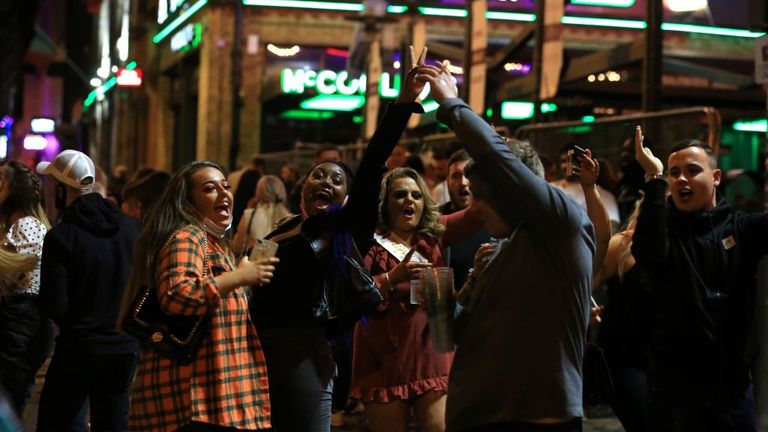Liverpool’s leaders have been told the city region will go into the strictest tier of England’s new lockdown system and the measures could last up to six months, Sky News understands.
Pubs, bars, gyms, casinos and bookmakers are expected to close, while restaurants, schools and universities will remain open.
Local leaders held a call with central government and asked for a monthly review of the situation.
The move has yet to be signed off by the prime minister, who is due to unveil the new three-tier system on Monday.
Some questions remain over exactly which businesses will have to shut. For example, pubs serving “substantial food” are set to remain open.
The leaders have asked for evidence to show what needs to close.
They are also expecting a financial contribution for track and trace systems and enforcement, but discussions on funding are ongoing.
Liverpool recorded the second-highest infection rate in the country in the two weeks to 4 October.
There were 4,593 confirmed cases, or 928.2 per 100,000 people.
The neighbouring council area of Knowsley was top, with 1,412 cases and an infection rate of 944.
Manchester is also likely to be in the highest tier of restrictions when the new system comes in.
Five of its MPs have warned the prime minister about the “devastating impact” of shutting businesses such as pubs.
In a letter, they said “jobs, livelihoods and businesses” would be damaged and that it would lead to more illegal gatherings.
The proposed system is expected to see different parts of England put in different categories, with areas in the highest level facing the toughest measures.
It could affect millions in the north and comes amid mounting concern over the number of coronavirus cases and intensive care capacity at hospitals.
The Manchester MPs’ letter was sent by Lucy Powell, Jeff Smith, Mike Kane, Afzal Khan and Graham Stringer.
They argued that a big proportion of cases were among students and confined to halls of residence.
They also said hospitality firms “constitute a very small proportion of infection rates” so authorities want powers to close individual companies that aren’t safe.
Leaders across northern England have criticised the plans, which they say have been drawn up without consulting them from the outset.
They have also not ruled out legal action and say the new financial help announced by the chancellor this week is not good enough.
The scheme will cover two-thirds of pay for people at businesses forced to shut due to the stricter rules.
Communities Secretary Robert Jenrick has rejected claims of a lack of consultation.
He told Sky’s Sophy Ridge on Sunday that the government had been “designing” restrictions for COVID hotspots “in conjunction with people who know those places best”.
Asked on what basis areas will move between tiers, he said people would need to “wait to see what the PM says” but that a range of factors had been considered.
Cases per 100,000 are “significant” but also hospitalisations and the nature of infections, said Mr Jenrick.
“Though the number of cases is rising rapidly across the country there are still huge variations,” he added.
“If you go to North Norfolk the latest statistics showed that the number of cases is around 19, if you go to Manchester it’s well over 500.
“So, it is right that we pursue a localised approach.
“That must be the way forward because none of us want to see a return to blanket national measures – that would be the alternative.”
Latest coronavirus figures reported on Sunday recorded 12,872 more cases and 65 deaths.
It is a slight fall from Saturday, when there were 15,166 cases and 81 deaths.
It comes after England’s deputy chief medical officer warned the country was at “a tipping point similar to where we were in March“.
Professor Jonathan Van-Tam urged people to stick to key social distancing and hygiene measures to keep transmission low and stop the NHS being overwhelmed.


